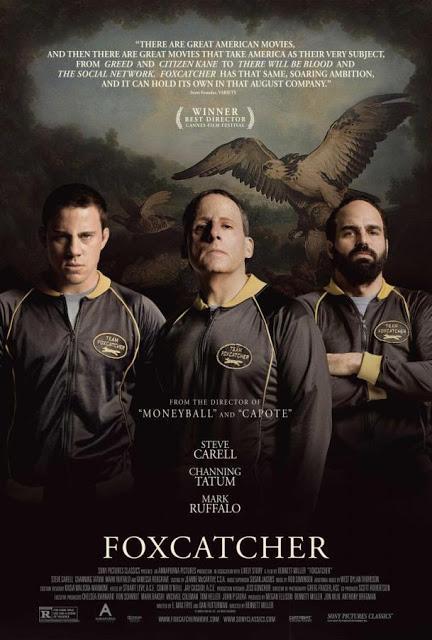 Foxcatcher is an
amazing work of cinema from USA that recalls the quality of evolved filmmaking
that one associate with Coppola’s The
Conversation (1974), Welles’ Citizen
Kane (1941) or Ridley Scott’s
British directorial debut film The
Duellists (1977).
Foxcatcher is an
amazing work of cinema from USA that recalls the quality of evolved filmmaking
that one associate with Coppola’s The
Conversation (1974), Welles’ Citizen
Kane (1941) or Ridley Scott’s
British directorial debut film The
Duellists (1977).
There are two likely reasons why many cineastes would skip watching Foxcatcher.
One, the filmmakers and the distributers of the film highlight the fact that the subject is about the sport of wrestling. It is. And, yet, it is not. By a coincidence the director Bennett Miller had a made a film called Moneyball (2011), all about another sport baseball, which turned out to be truly a poor cousin of Foxcatcher as it did not offer much beyond baseball and those who manage/manipulate the sport.
Second, the film Foxcatcher highlights the fact that it is based on true events. That’s yet another common thread with Moneyball and with yet another Miller-directed film, Capote (2005). One is then led to assume Foxcatcher too will be all about an individual or the famous du Pont family as in Moneyball or Capote. Actually the film Foxcatcher is not about the famous family but more about three very different individuals, of which only one, John Du Pont, is from the illustrious business family. What is more, the director Bennett Miller urges the viewer to look beyond the three prime individuals in the film. Miller’s film (possibly through mere deduction, the credit ought to go to co-scriptwriter E. Max Frye rather than co-scriptwriter Dan Futterman, as the former was the sole scriptwriter of the less colourful Capote) urges the viewer to look at priorities of the American society, if not of the larger developed world, that the actions of the three individuals represent. And how subtly Miller and Frye does that won Miller the Cannes best director award in 2014. Predictably, the Oscar voters for whom subtlety is a weakness rather than strength overlooked the five major nominations for Foxcatcher (two acting awards, one for direction and one for screenplay) and bestowed them on lesser works. [Even the lovely impressive Oscar nominated work of British director Mark Leigh Mr Turner (2014) was ignored by the Oscar voters.]
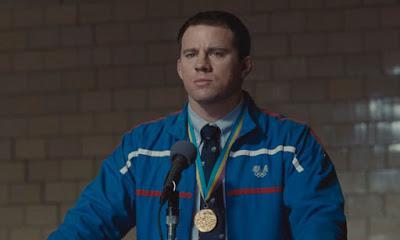
"My name is Mark Schultz. I wanna talk about America,..."
Mark (Channing Tatum) speaking to school kids
Early in the film the viewer hears the following lines spoken by a lead character to a group of school kids: “My name is Mark Schultz. I wanna talk about America, and I wanna tell you why I wrestle.” Miller, Frye, and Futterman make it amply clear—the film is a social statement about the nation as well—if not the developed materialistic world. It’s only later as the film progresses that nationalism recedes, and egos and materialistic factors emerge to the fore.
Foxcatcher is a complex true story of the multimillionaire John Du Pont (Steve Carell) sponsoring and “training” two US Olympic wrestling gold medallists Mark and Dave Schultz (Channing Tatum and Mark Rufallo) for personal aggrandizement and how it wrecks the lives and families of all concerned.
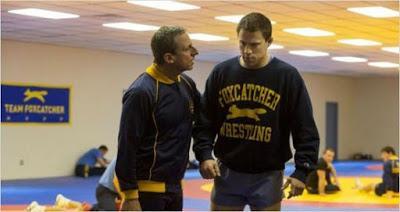
"Coach is the father.. mentor...a great power in an athlete's life":
John du Pont (Steve Carell) and Mark (Channing Tatum)
The marriage of good direction and screenplay writing comes through details—an Olympic gold medallist reduced to eating quick fix noodles bought from grocery stores with hardly any nutritional value. He evidently needs money to eat better food. The quality of direction and screenplay comes through the lack of spoken dialogue. It comes through bizarre, disassociating conversations that remind you of Welles’ Citizen Kane as when the mother of an adult multimillionaire discusses disposing the toy train of her son. It is not the train that matters. It is not even shown in the film. What that little but important sequence does is that it fleshes out the characters indirectly of both John Du Pont (Steve Carell) and his caring mother Jean du Pont (Vanessa Redgrave). Ms Redgrave has very little screen time and speaks very few lines—but it is her gestures and demeanour that talk a great deal. Of course, there are the critical observations John makes of his mother Jean, revealed to Mark Schultz (Channing Tatum) during an unguarded moment. Such indirect character development is rare in cinema. The periods of silences in Miller’s Foxcatcher speak loudly and help develop the bizarre true story.
Equally stunning is the first show of a gun in the film Foxcatcher. John Du Pont arrives at the wrestling training area on his own estate with a gun and dramatically shoots at the roof. One is reminded of the bizarre actions of the trainer in Whiplash, another 2014 film from USA. For what? To make his wrestlers train harder to win at a forthcoming wrestling event. The gun culture in USA was relevant centuries ago, but guns in a secure contemporary world of the du Pont estate, is not. It not merely recreating a possible true event John du Pont’s life for Miller but a visually critical statement of the man and the segment of society his wealth represent, if one studies the camera positioning to capture the scene directed by Miller.
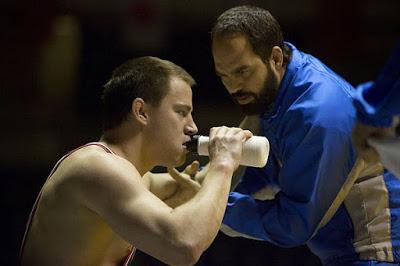
Mark (Tatum) being coached by elder brother Dave (Mark Ruffalo)
The fictional Kane in Citizen Kane and the real John du Pont in Foxcatcher are both immensely rich egomaniacs. Both films are similar in developing the characters of the super rich Americans. Both are lonely individuals and both films seek clues to flesh out their characters from their childhood toys and possessions (Kane’s sleigh vs John du Pont’s toy train). A cineaste will note the parallels between Jean du Pont (Vanessa Redgrave) in Foxcatcher and the fictional Mary Kane (Agnes Moorehead) in Citizen Kane, towards their respective sons.
It is important and interesting to note the obvious devaluation of women characters in Foxcatcher. There are only two women characters in Foxcatcher: Jean du Pont who hardly speaks in the movie and Dave Schultz’ wife Nancy (Sienna Miller, who incidentally is not related to the director Bennett Miller though they share the same surname) and both are not major figures in the film. Mark Schultz does not have a girlfriend in the entire film Foxcatcher and is never shown to have a private life. His only friend is his elder brother Dave who is happily married. Even the John du Pont in Miller’s Foxcatcher does not seem to be interested in anyone sexually. The real Mark Schuitz stated that he was privy to the fact that John du Pont was a eunuch, following a horse riding accident. (It is not surprising to find the line spoken by John in the film.. “I do not share my mother's affection for horseflesh.”) More importantly, both John and Mark are loners, desperate for recognition, in contrast to Dave who is happy with a happy married life and two kids. As loners, both don’t care to have friends of either sex. The only friend for Mark is his elder brother Dave, and that has its own psychological ramifications as he is also his true coach.
But the attraction of money changes the life of the two wrestlers in different ways. And tragically, at that. On the other hand, money for John du Pont could buy brief fame as an Olympics wrestling coach, which he was not and could never be.
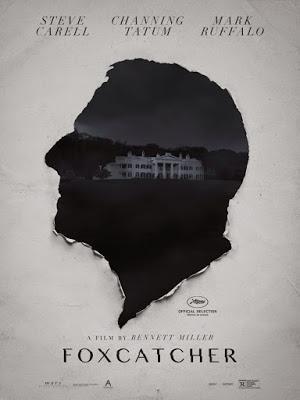
Steve Carell's nose (beak for ornithologists) accentuated
in the poster...
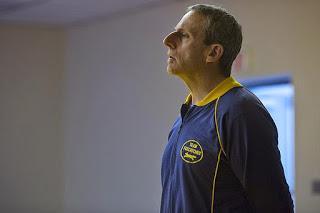
...and the cinematography
The real life John du Pont and the movie character John du Pont are both ornithologists. At several points in the movie the screenplay writers bring in metaphors of birds. John asks Mark to address him as Eagle, or Golden Eagle, if he wishes to do so. John asks Mark to watch the birdlife on the estate and gives him binoculars to that—an overt touch of friendship (“You are a good friend, Mark,” says John later). Even while describing himself, John put himself as an ornithologist first and then a philanthropist. Here are other bird metaphors from spoken lines: ”When we fail to honor that which should be honoured, it's a problem. It's a canary in a coal mine. Do you bird-watch?... You can learn a lot from birds. I'm an ornithologist. But more importantly, I am a patriot. And I want to see this country soar again. “ Birds connect with the nation and the larger social commentary in the film Foxcatcher.
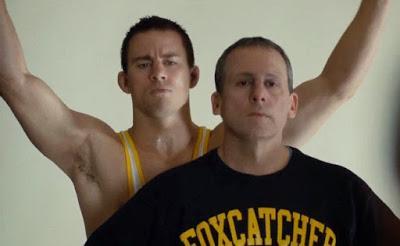
Money can buy fame--Olympic Gold Medalist (Tatum) in the background,
John du Pont (Carell) a 'wannabe' coach takes the foreground
The importance of Foxcatcher as a good film is not just in its direction and commendable script but its lead actors. Beyond the brilliant casting coup of getting Steve Carell with his beak –like nose to play “Eagle” John (his profile has been used so well in some posters of the film), Carell proves that an actor typecast as such can play a complex dramatic role with a flourish. One is reminded of the comic genius Danny Kaye playing the ragpicker in Bryan Forbes’ The Madwoman of Chaillot (1969) introducing a side of Kaye the actor rarely recognized. Carell is top notch and it is truly unfortunate that he was not honoured with an Oscar for which he was nominated. Mark Ruffalo was nominated for the supporting actor Oscar but one wishes the nominators had considered Channing Tatum as well who was able to show a range of emotions, subtle and not-so-subtle.
Finally, director Miller’s choice of music that plays on the soundtrack is apt and embellishes the script. “Für Alina” by Arvo Pärt is perhaps the most apt piece of music for the movie (director Andrei Zvyagintsev used it in his film The Banishment), followed by David Bowie’s “Fame” and Mychael Danna’s “I thought he was a very nice gentleman.” How appropriate!
The film proves to be a testament on the frailty and loneliness of the rich and famous. It equally proves that chase for lucre can wreck the lives of those not fortunate to be born rich. And it looks at distorted self aggrandizement in the garb of nationalism.
P.S. The film won the best director award at the Cannes film festival in 2014. Ridley Scott's The Duellists (1977), mentioned in the above review, has been reviewed on the blog earlier.

